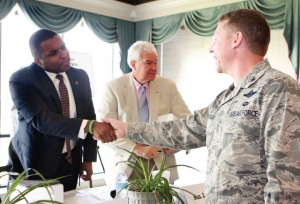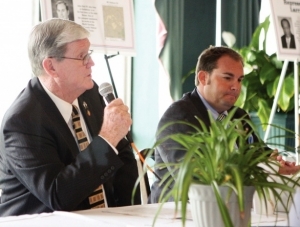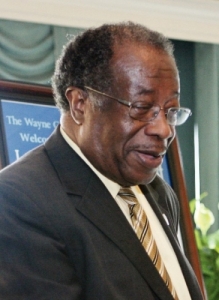Session wrap-up
By Steve Herring
Published in News on September 6, 2013 1:46 PM

News-Argus/CASEY MOZINGO
Sen. Don Davis, left, and Seymour Johnson Air Force Base 4th Fighter Wing Vice Commander Col. Evan Pettus shake hands after the panel discussion at Lane Tree Golf Club Thursday morning. Also pictured is Sen. Louis Pate.

News-Argus/CASEY MOZINGO
Rep. Jimmy Dixon makes his opening remarks during the legislative breakfast at Lane Tree Golf Club Thursday morning. Also pictured is Rep. John Bell.

N.C. Rep. Larry Bell
Party-line differences on issues like Medicaid, health care and whether or not education funding increased or decreased during the recent state legislative session were clearly visible Thursday among Wayne County's five-member legislative delegation.
However, they said that when it comes to looking after the best interests of Wayne County and eastern North Carolina they are able to set those differences aside.
Sens. Louis Pate, R-Wayne, and Don Davis, D-Greene, and Reps. John Bell, R-Wayne, Jimmy Dixon, R-Duplin, and Larry Bell, D-Sampson, reviewed the recent legislative session and looked ahead to next year's short session during Thursday morning's End of Session Legislative Update held at the Lane Tree Golf Club.
Close to 15o people attended the Wayne County Chamber of Commerce event that was sponsored by The News-Argus.
The forum, which was almost conversational in nature between the legislators, broke no new ground, but did offer some insight into what state lawmakers may tackle during the short session.
"Medicaid and mental health reform, I think you are going to see them come up in the short session," John Bell said. "Actually, I have been told that is what is going to be focused on in the short session. We are at a point where we have to do something about it when you have a $600 million shortfall.
"Mental health, I have met with every hospital in my district. Mental health reform is a major issue in our hospitals. Where are these people going? They are taking up hospital beds. It is not just affecting the folks who are mentally unstable. It is affecting our whole community."
The public will see some kind of reform, he said.
John Bell said he had supported the state's decision not to expand Medicaid.
Dixon said Medicaid was new to him and that he looked to others who have more experience.
Organizations have been formed that know how to "harvest" Medicaid dollars and the fraud rate could be as high as 37 percent, he said. Dixon said he wanted the benefits to get to the people that need them.
Pate blamed the Medicaid shortfall for why state employees and teachers did not receive raises this year.
He agreed with Dixon that the program is "fraught" with all sorts of fraud. For example, he said, the state's border counties have the highest numbers of Medicaid patients because people from surrounding states are taking advantage of North Carolina's program.
A study group has been created that will examine the issue and make recommendations to legislators, he said. Pate said he expects a special session will be needed to address Medicaid.
"When we talk about expansion of Medicaid, what we are talking about my friends, is making sure that North Carolinians, our neighbors, friends and even some of us, have access to health care," Davis said.
Lawmakers have played politics with the issue for far too long, he said. What has been successfully done is to cloud the issue, he added.
The state needs to expand Medicaid, something that had been his position all along, Davis said. The expansion would bring in millions of dollars was well as jobs.
"In terms of cleaning out fraud, we all agree with that. But at the same time we can agree to expand and more forward as we are doing this."
Davis said he believes the state is capable of expanding the program and addressing the fraud issue at the same time.
Larry Bell agreed with Dixon that if you didn't know a lot about a subject then you didn't need to talk about it much. Bell also agreed with Davis that he has heard a lot of rhetoric, but not seen a lot of action.
"Anybody can talk about how bad it is, but one never hears any solutions to the problem," he said.
The same is true for the Affordable Care Act, or Obamacare, Larry Bell said. People are critical 0f the program, but offer no alternative solutions, or how to improve it or to make it better.
"I am still waiting to try support something that is really relevant to the problem that we have. I see people every day who can't get help. I don't have the answer. I wish I did."
His comments moved the conversation to health care and Obamacare. For the most part, the legislators all said it was a congressional issue they had no control over.
Pate said people needed to talk to their congressmen and let them know how the law affects their pocketbooks.
Davis said that every part of the law is not perfect, but that the state and nation need to move forward with it.
Larry Bell suggested that more should be done with preventive health care such as blood pressure and diabetes testing. Catching those problems early would help reduce the number of people who end up in the emergency room, he said.
John Bell suggested that the local delegation invite the area's congressmen to sit down with them, similar to Thursday's session, to discuss the issue.
The three Republicans said that the state budget increased spending for education. The Democrats disagreed, saying that the level of funding depended on how the numbers were presented.
The five did agree that they had been able to work together on a number of issues affecting Seymour Johnson Air Force Base and eastern North Carolina's other military bases.
One of the most important one is a new law regulating the permitting of large windmills for wind farms. One such farm had been planned near the coast that would have endangered Seymour Johnson's use of a bombing range in Dare County.
They also agreed that there is a need for an eastern North Carolina caucus in the General Assembly. It has been discussed, but the busy long session did not allowed enough time to form one, they said.
Dixon said that a rural caucus, already in existence, meets those needs. It is made up of rural area representatives from both the western and eastern parts of the state. He said he could see the group having an eastern and western division.
